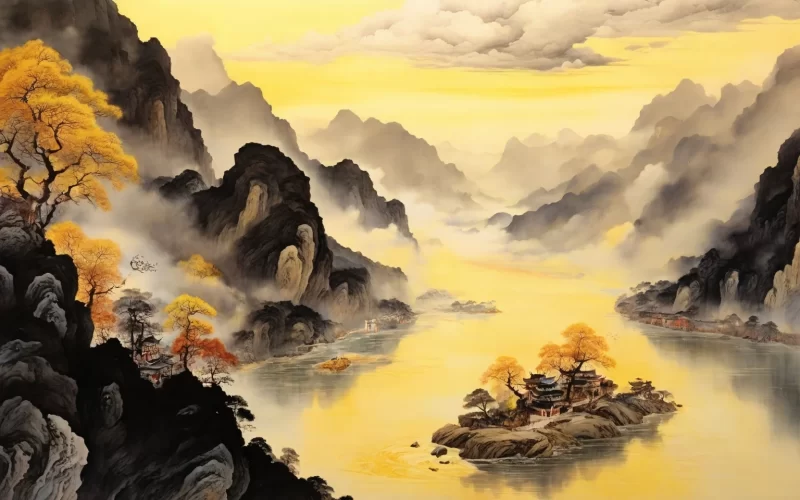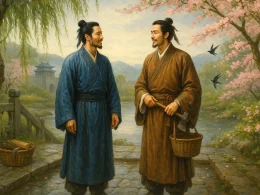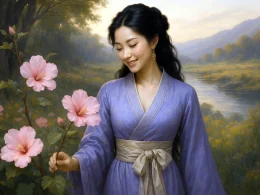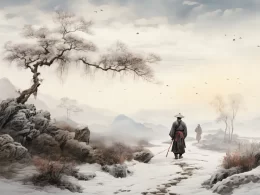I am the madman of the Ch'u country
Who sang a mad song disputing Confucius.
...Holding in my hand a staff of green jade,
I have crossed, since morning at the Yellow Crane Terrace,
All five Holy Mountains, without a thought of distance,
According to the one constant habit of my life .
...Lu Mountain stands beside the Southern Dipper
In clouds reaching silken like a nine-panelled screen,
\Vith its shadows in a crystal lake deepening the green water.
The Golden Gate opens into two mountain-ranges.
A silver stream is hanging down to three stone bridges
Within sight of the mighty Tripod Falls.
Ledges of cliff and winding trails lead to blue sky
And a flush of cloud in the morning sun,
Whence no flight of birds could be blown into Wu .
...I climb to the top. I survey the whole world.
I see the long river that runs beyond return,
Yellow clouds that winds have driven hundreds of miles
And a snow-peak whitely circled by the swirl of a ninefold stream.
And so I am singing a song of Lu Mountain,
A song that is born of the breath of Lu Mountain.
...Where the Stone Mirror makes the heart's purity purer
And green moss has buried the footsteps of Hsieh,
I have eaten the immortal pellet and, rid of the world's troubles,
Before the lute's third playing have achieved my element.
Far away I watch the angels riding coloured clouds
Toward heaven's Jade City, with hibiscus in their hands.
And so, when I have traversed the nine sections of the world,
I will follow Saint Lu-ao up the Great Purity.
Original Poem
「庐山谣寄卢侍御虚舟」
李白
我本楚狂人,凤歌笑孔丘。
手持绿玉杖,朝别黄鹤楼。
五岳寻仙不辞远,一生好入名山游。
庐山秀出南斗傍,屏风九叠云锦张,
影落明湖青黛光。
金阙前开二峰长,银河倒挂三石梁。
香炉瀑布遥相望,回崖沓嶂凌苍苍。
翠影红霞映朝日,鸟飞不到吴天长。
登高壮观天地间,大江茫茫去不还。
黄云万里动风色,白波九道流雪山。
好为庐山谣,兴因庐山发。
闲窥石镜清我心,谢公行处苍苔没。
早服还丹无世情,琴心三叠道初成。
遥见仙人彩云里,手把芙蓉朝玉京。
先期汗漫九垓上,愿接卢敖游太清。
Interpretation
Composed in 760 CE (the first year of the Shangyuan era) after Li Bai was pardoned during his exile to Yelang, this work was written when he met his friend Lu Xuzhou in Jiangxia (modern Wuhan) and toured Mount Lu together. Nearing sixty years of age and having experienced the An Lushan Rebellion, his involvement with Prince Yong's campaign, and subsequent exile, Li Bai's political ideals were completely shattered. This poem is not merely a tribute to the wondrous scenery of Mount Lu but, after a life full of hardships, represents his final summation of life's journey and ultimate spiritual homecoming.
Part 1: "我本楚狂人,凤歌笑孔丘。手持绿玉杖,朝别黄鹤楼。五岳寻仙不辞远,一生好入名山游。"
Wǒ běn Chǔ kuáng rén, fèng gē xiào Kǒngqiū. Shǒu chí lǜ yù zhàng, cháo bié Huánghè Lóu. Wǔ yuè xún xiān bù cí yuǎn, yīshēng hǎo rù míngshān yóu.
I am that Madman of Chu who sang the phoenix song, laughing at Confucius; Holding an emerald-green jade staff, at dawn I bid farewell to the Yellow Crane Tower. To seek immortals across the Five Sacred Peaks, I fear no distance; All my life I have loved roaming among famous mountains.
The poet begins by identifying himself with the "Madman of Chu" from the Analects, who mocked Confucius' dedication to public service, openly declaring his break with the mainstream pursuit of an official career. The "jade staff" symbolizes the immortal's tool, while "dawn farewell" brims with decisive departure and ethereal freedom. These six lines serve as Li Bai's summative declaration in his later years: a complete shift from early political engagement to a life form centered on "seeking transcendence and embracing nature."
Part 2: "庐山秀出南斗傍,屏风九叠云锦张,影落明湖青黛光。金阙前开二峰长,银河倒挂三石梁。香炉瀑布遥相望,回崖沓嶂凌苍苍。翠影红霞映朝日,鸟飞不到吴天长。"
Lúshān xiù chū nándǒu bàng, píngfēng jiǔ dié yún jǐn zhāng, yǐng luò míng hú qīng dài guāng. Jīn què qián kāi èr fēng cháng, yín hé dào guà sān shí liáng. Xiānglú pùbù yáo xiāng wàng, huí yá tà zhàng líng cāng cāng. Cuì yǐng hóng xiá yìng zhāo rì, niǎo fēi bú dào Wú tiān cháng.
Mount Lu's beauty rises near the Southern Dipper's stars; Its nine-fold screen of peaks spreads like brocade of clouds. Their shadows fall upon the bright lake, gleaming blue-black; Before the golden gates, twin peaks stand tall. The Milky Way hangs upside down from three stone bridges; Incense Burner Falls gaze afar at each other. Winding cliffs and layered ridges pierce the azure sky; Green shadows and rosy clouds bathe the rising sun— Where no birds reach, the Wu sky stretches endlessly.
This section paints Mount Lu's "beauty" and "wonder" with monumental brushstrokes. Through lavish imagination like "Southern Dipper," "cloud brocade," and "inverted Milky Way," the poet elevates the mountain to a transcendent, immortal realm. His depiction is both a natural marvel and a pure, lofty spiritual symbol independent of the dusty world.
Part 3: "登高壮观天地间,大江茫茫去不还。黄云万里动风色,白波九道流雪山。"
Dēng gāo zhuàngguān tiāndì jiān, dà jiāng mángmáng qù bù huán. Huáng yún wàn lǐ dòng fēng sè, bái bō jiǔ dào liú xuě shān.
Ascending high, I behold heaven and earth's grandeur; The great river flows boundlessly eastward, never to return. Yellow clouds stretch ten thousand miles, shifting with the wind; White waves in nine channels flow like snow-capped mountains.
This part offers the poem's most cosmic perspective. "The great river flows boundlessly eastward" describes natural law while metaphorically hinting at time's passage and life's irreversibility. The turbulent imagery of "yellow clouds" and "white waves" mirrors both the river's majesty and the era's upheavals reflected in the poet's heart.
Part 4: "好为庐山谣,兴因庐山发。闲窥石镜清我心,谢公行处苍苔没。"
Hǎo wèi Lúshān yáo, xìng yīn Lúshān fā. Xián kuī shí jìng qīng wǒ xīn, Xiè gōng xíng chù cāng tái méi.
I delight in composing this Mount Lu ballad, inspired by its beauty; In leisure, gazing into the stone mirror, my heart is cleansed. Where Lord Xie once trod, green moss now buries the path.
Emotion turns inward from external grandeur to inner peace. "The stone mirror clears my heart" signifies nature's purifying effect on the soul. Mentioning Xie Lingyun adds historical depth: even the most illustrious figures are eventually buried by time, dissolving the pursuit of fame while highlighting nature and poetry's eternity.
Parts 5-6: "早服还丹无世情,琴心三叠道初成。遥见仙人彩云里,手把芙蓉朝玉京。先期汗漫九垓上,愿接卢敖游太清。"
Zǎo fú huán dān wú shìqíng, qín xīn sān dié dào chū chéng. Yáo jiàn xiānrén cǎiyún lǐ, shǒu bǎ fúróng cháo yùjīng. Xiān qī hànmàn jiǔ gāi shàng, yuàn jiē Lú Áo yóu tàiqīng.
Having long consumed the golden elixir, I'm free of worldly cares; Through three-fold harmony, my Taoist cultivation first succeeds. Afar, I see immortals in rainbow clouds, holding lotus blossoms, paying homage to the Jade Capital; I have an appointment with the Boundless One upon the Nine Heavens, And wish to guide you, like Lu Ao, roaming the Great Purity.
The poem culminates in a fantastic immortal realm. The poet claims release from "worldly cares" and achieving "Tao's initial completion" spiritually. The final invitation, alluding to the encounter between Lu Ao and the immortal in Huainanzi, cleverly compares friend Lu Xuzhou to Lu Ao, expressing the sublime ideal of transcending reality with a kindred spirit in pursuit of absolute spiritual freedom.
Holistic Appreciation
This poem stands as one of Li Bai's most mature romantic masterpieces. Using the motif of "journey" as its structural thread, it traces a complete spiritual trajectory: from self-declaration, through majestic landscape immersion, to cosmic contemplation, historical reflection, spiritual sublimation, and finally an invitation to transcendent realms. Its emotional tone resonates with heroic detachment. Having weathered life's most extreme vicissitudes, the poet transmutes all resentment and disappointment into a passionate pursuit of natural harmony and Taoist enlightenment, revealing a vital energy that embodies "rebirth from despair" and an immortal romantic spirit.
Artistic Merits
- Apotheosis of Self-Image: The poet directly assumes the role of the "Madman of Chu," proclaiming himself an enlightened Taoist, merging the lyrical persona with myth and legend, creating a highly idealized image.
- Grand Spatial Structure: The poetic perspective shifts freely among towers, mountains, rivers, stars, and immortal realms, constructing a vertical, multidimensional, and vast aesthetic space.
- Adaptive Use and Reversal of Allusions: Whether "Madman of Chu" or "receiving Lu Ao," the poet's use of allusions is not mere quotation but personalized adaptation and fusion, serving his emotional expression.
Insights
This work demonstrates the highest realm of transcending suffering. It teaches us that when one encounters complete failure in the real world, they can still crown themselves in the spiritual domain, becoming the sovereign of their own kingdom. By merging his personal fate with the vastness of nature and magnificent mythology, Li Bai transcended finite life. This spirit of "communing with the essence of heaven and earth" allows personal sorrow to be purified within the cosmos's grandeur, transforming into an eternal artistic force that inspires all who seek a spiritual path through adversity.
Poem translator:
Kiang Kanghu
About the poet

Li Bai (李白), 701 - 762 A.D., whose ancestral home was in Gansu, was preceded by Li Guang, a general of the Han Dynasty. Tang poetry is one of the brightest constellations in the history of Chinese literature, and one of the brightest stars is Li Bai.












